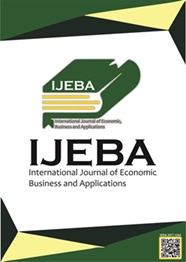COMPARATIVE ANALYSIS OF MARKET OVERREACTION IN INDONESIA AND SINGAPORE STOCK EXCHANGE 2016-2019
Abstract
This study aims to determine whether there is a market overreaction phenomenon in the Indonesia Stock Exchange which is classified as an emerging market and the Singapore Stock Exchange which is classified as a developed market. This research was conducted in a weekly period during 2016-2019. This study uses sample included in the LQ-45 index for the Indonesia Stock Exchange and the top 30 market cap for the Singapore Stock Exchange. This research found that there was a market overreaction in the Indonesia Stock Exchange, especially the loser portofolio which experienced the strongest reversal. Meanwhile, the significance value in the one sample t-test for the average cumulative abnormal return difference value is not significance. While the results of research on the Singapore Stock Exchange found no market overreaction phenomenon as indicated by a negative and insignificance average cumulative abnormal return difference. The result showed that the Indonesia Stock Exchange has not been efficient where investors tend to overreact in responding to information while investors on the Singapore Stock Exchange are rational.
Keywords
Full Text:
PDFReferences
Ali, R., Ahmad, Z., & Anusakumar, S. V. (2012). Stock market overreaction and trading volume: Evidence from Malaysia. Asian Academy of Management Journal of Accounting and Finance.
Ali, S. R. M. (2020). Do momentum and reversal matter in the Singapore stock market? Asia-Pacific Journal of Accounting and Economics, 00(00), 1–17. https://doi.org/10.1080/16081625.2020.1754255
Amelia, R., & Wijayanto, A. (2018). The Winner Loser Anomaly In Indonesia. Management Analysis Journal.
Baytas, A., & Cakici, N. (1999). Do markets overreact: International evidence. Journal of Banking and Finance, 23(7), 1121–1144. https://doi.org/10.1016/S0378-4266(98)00133-2
Bondt, W. F. M. De, & Thaler, R. (1985). Does the Stock Market Overreact? The Journal of Finance. https://doi.org/10.2307/2327804
Bowman, R. G., & Iverson, D. (1998). Short-run overreaction in the New Zealand stock market. Pacific Basin Finance Journal, 6(5), 475–491. https://doi.org/10.1016/s0927-538x(98)00021-3
Chang, R. P., McLeavey, D. W., & Rhee, S. G. (1995). Short-Term Abnormal Returns of The Contrarian Strategy in The Japanese Stock Market. Journal of Business Finance & Accounting. https://doi.org/10.1111/j.1468-5957.1995.tb00892.x
Darusman, D. (2012). Analisis Pengaruh Firm Size , Book To Market Ratio , Price Earning Ratio , Dan Momentum Terhadap Return Portofolio Saham. Diponegoro Journal of Management.
Dewanthi, P. T., & Wiksuana, I. G. B. (2017). Analisis Overreaction Saham Winner - Loser Pada Perusahaan Indeks BISNIS - 27 Di Bursa Efek Indonesia. E-Jurnal Ekonomi Dan Bisnis Universitas Udayana. https://doi.org/10.24843/eeb.2017.v06.i11.p08
Dissanaike, G. (1997). Do stock market investors overreact? Journal of Business Finance and Accounting. https://doi.org/10.1111/1468-5957.00093
Fama, E. F. (1970). Efficient Capital Markets: A Review of Theory and Empirical Work. The Journal of Finance. https://doi.org/10.2307/2325486
Hadimas, H. (2019). Overreaction Anomaly di Pasar Modal Indonesia (Studi Pada Saham-Saham LQ-45 Tahun 2014-2018). Journal of Business Economics. https://doi.org/10.35760/eb.2019.v24i1.1857
Hadioetomo, & Sukarno, A. (2009). Winner Dan Loser Saat Terjadi Anomali Winner-Loser. Jurnal Keuangan Dan Perbankan, 13(2), 209–227.
Han, C., Hwang, S., & Ryu, D. (2015). Market overreaction and investment strategies. Applied Economics. https://doi.org/10.1080/00036846.2015.1058913
Heryana, T. (2017). Analisis Pembalikan Harga Saham di Indonesia Berbasis Overreaction Hypothesis, Ukuran Perusahaan, Likuiditas Saham dan Bid-Ask Spread. Jurnal Riset Akuntansi Dan Keuangan. https://doi.org/10.17509/jrak.v4i3.4674
Hirshleifer, D. (2015). Behavioral Finance. In Annual Review of Financial Economics. https://doi.org/10.1146/annurev-financial-092214-043752
Jogiyanto. (2010). Teori portofolio dan analisis investasi (edisi ketujuh). Yogyakarta: BPFE.
Lerskullawat, P., & Ungphakorn, T. (2019). Does overreaction still exist in Thailand? Kasetsart Journal of Social Sciences. https://doi.org/10.1016/j.kjss.2018.02.001
Maharani, S., & Witiastuti, R. S. (2015). Fenomena Market Overreaction di Bursa Efek Indonesia. Management Analysis Journal. https://doi.org/10.15294/maj.v4i1.7209
Mazouz, K., & Li, X. (2007). The overreaction hypothesis in the UK market: Empirical analysis. Applied Financial Economics. https://doi.org/10.1080/09603100600749303
Mun, J. C., Vasconcellos, G. M., & Kish, R. (2000). The Contrarian/Overreaction Hypothesis: An analysis of the US and Canadian stock markets. Global Finance Journal. https://doi.org/10.1016/s1044-0283(00)00011-9
Murtini, U., & Widyatmadja, Y. K. (2011). Pengaruh Overreaction Terhadap Harga Saham. Riset Akuntansi Keuangan, 7(1), 31–37.
Nofsinger, J. R. (2001). Investment Madness How Psychology Affects Your Investing And What To Do About It. In Journal of Chemical Information and Modeling.
Octavio, D. Q., & Lantara, I. W. N. (2014). Market Overreaction, Size Effect atau Liquidity Effect? Studi pada Bursa Efek Indonesia. Jurnal Manajemen, Strategi Bisnis Dan Kewirausahaan.
Pasaribu, R. B. (2011). Overreaction Anomaly in Indonesia Stock Exchange: Case Study of LQ-45 Stocks. Journal of Economics and Business, 5(2), 57–115.
Piccoli, P., Chaudhury, M., Souza, A., & da Silva, W. V. (2017). Stock overreaction to extreme market events. North American Journal of Economics and Finance. https://doi.org/10.1016/j.najef.2017.04.002
Pratama, I. G. S., Purbawangsa, I. B. A., & Artini, L. G. S. (2016). Analisis Overreaction Pasar Pada Saham Winner Dan Loser Di Bursa Efek Indonesia. 12, 4387–4414.
Reddy, K., Qamar, M. A. J., Mirza, N., & Shi, F. (2020). Overreaction effect: evidence from an emerging market (Shanghai stock market). International Journal of Managerial Finance. https://doi.org/10.1108/IJMF-01-2019-0033
Rehman, S.-, & Said, B. (2019). Analysis of Investor Overreaction Effect and Random Walk: A Case Study of Pakistan Stock Exchange. Sarhad Journal of Management Sciences. https://doi.org/10.31529/sjms.2018.5.1.1
Said, M., Faisal, & Abd., M. M. S. (2018). Overreaction and underreaction anomalies in the Indonesian stock market: a sectoral analysis. International Journal of Ethics and Systems, 34(4), 442–457. https://doi.org/10.1108/IJOES-12-2017-0235
Slovic, P. (1969). Analyzing the expert judge: A descriptive study of a stockbroker’s decision process. Journal of Applied Psychology. https://doi.org/10.1037/h0027773
Slovic, P. (1972). Psychological Study of Human Judgment: Implications For Investment Decision Making. The Journal of Finance. https://doi.org/10.1111/j.1540-6261.1972.tb01311.x
Valentina, E., Rikumahu, B., & Khairunnisa. (2017). Analisis Price Reversal Di Bursa Efek Indonesia: Studi Kasus Indeks Bisnis 27 Periode Januari 2015 – Desember 2016. 4(1), 135–145.
Widiastuti, E., & Jaryono. (2011). Short Contrarian Investment Strategy : Pengujian Winner-Loser Anomaly Pada Saham-Saham Di Bursa Efek Indonesia. Performance, 14(2), 49–63.
DOI: http://dx.doi.org/10.31258/ijeba.6.2.19-44
Refbacks
- There are currently no refbacks.





.png)
.png)
.png)


